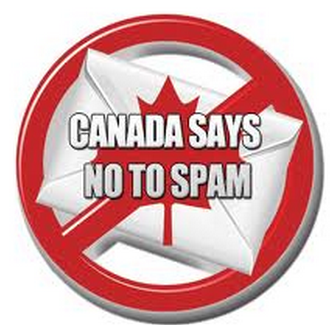What Canada’s New Anti Spam Law Means For Marketers (Even in the US)
Do you have customers in Canada? Do you email your customers? Thinking about setting up an email campaign for your customers? Now is the time to learn about the new Canadian Anti Spam Law that comes into effect this July (2014) in Canada, and yes this applies to companies based in the United States.
This new law is expected to have the most severe penalties in place for those who violate. The maximum penalty for an individual that sends out spam is $10,000 and $1,000,000 for an organization.
With email marketing making a resurgence of sorts, this new legislation will make it far more difficult for companies to employ new marketing tactics to reach customers and even more difficult to reach prospects. With 2014 really being the year of mobile (in my opinion), this will definitely throw a wrench into the mix. Marketers are going to have to come up with new ways to get the coveted attention of the audience.
Here is a synopsis of what you need to know:
1. Existing Email Lists
If you have an existing relationship, it is expected that you will have a very clear process for opting out if the recipient decides that he or she no longer wishes to receive email.
Implications: If you do not have a very clear (and easy) process for customers, you are at risk for violating the anti spam law.
AND very importantly the email MUST be relevant to the recipient’s role and/or duties.
Implications: This is an important nuance that marketers must be aware of.
2. Buying New Email Lists
While this new law does not prohibit the buying new email lists, it is very clear that all parties must adhere to the existing Canadian Personal Information Protection and Electronic Documents Act (PIPEDA). Additionally, the same rules apply for having express consent and also having a clear opt-out process.
Implications: There will be an extra level of due diligence required for companies both selling and buying lists. The question you need to ask yourself in order to protect you and your organization is: Will you be able to determine if Canadians are included in the lists?
3. Text Messages and “Cellphone” Spam
Think you can still text or reach out by cellphone? Think again. The same conditions for email apply to these marketing/communications tools.
Implications: Your text messages now need to have an opt-out option AND you need express consent. From a personal standpoint I can relate to this. Organizations texting me and I never signed up to receive texts. This will be an interesting scenario for travellers to the US. How will phone companies be handling sending text messages to Canadians when we have not expressly consented? What will happen as a result of unwanted text messages?
4. Does this legislation cover all businesses, including government and not-for-profits?
Like the Canadian Do-Not-Call list, it does not.
Political parties and charities are exempt as long as they are not engaging with people for the primary reason of selling and/or promoting a product. Some might argue that a political party promoting a candidate is selling a product, but it is not clear how this fits into the equation. This might actually be a good test-case for the law. Based on the Do-Not-Call list, I suspect that politicians can still send such email.
5. When exactly does this new law come into effect?
While the key provisions will be effective July 1, 2014, the full effects will not be in place for 36 months. In fact, small business and not-for-profits are being given this grace period to accommodate the changes that this means for them. Realizing that they might have the technology and/or resources of larger and for-profit organizations, the government is providing more time to these organizations to make the change.
Do you have concerns over this new legislation? Are you versed on these changes? I would love to hear your thoughts.


Great post Heather-Anne!
Thanks Brandon. Always appreciate feedback.